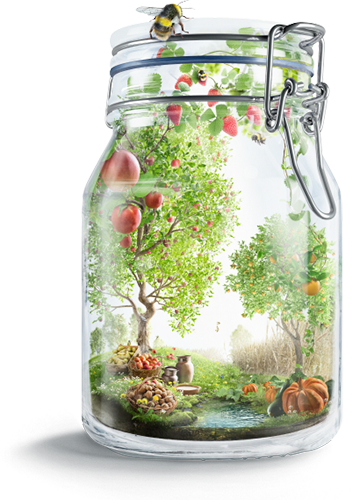
Production and transport efficiency
We continuously improve the efficiency of our production, switch to renewable electricity, conserve energy and water, and reduce waste. We optimize our transport and deploy technologies for decarbonization.

We have set ourselves the bold ambition to decarbonize our production processes. This means both reducing our energy usage – we plan to halve our energy use by 2030 – and purchasing or generating green energy.
To achieve our goals, sustainability is being purposefully embedded in our business. We closely track and plan our capital expenditure on sustainability. In 2022, approximately 6% of our capital expenditure contributed to realizing our sustainability commitment. Besides a clear path of energy reduction, our efforts are also geared towards reducing water use and waste to a minimum.

Our sustainability pillars
Sourcing and supplier partnering
We work in partnership with our suppliers on sustainable agriculture and fair labor conditions. We are also innovating to make our ingredient sourcing and packaging more sustainable.
Production and transport efficiency
We continuously improve the efficiency of our production, switch to renewable electricity, conserve energy and water, and reduce waste. We optimize our transport and deploy technologies for decarbonization.
Naturally healthy food
Conserving nature's goodness via naturally healthy food. We will leverage our brands to educate and collaborate with consumers on a holistic diet good for us and for the planet. We will enhance our portfolio to give consumers more naturally healthy options – more of the good like nuts and whole grain and less of the bad like refined sugar and red meat.
Purposeful people
Growing and developing our people. Hero is a values-led family company and that's reflected in our culture. We work hard to keep our team feeling engaged, included, and motivated. We encourage personal development, health and safety in our workplaces, and we engage with local communities.
Using energy efficiently
We are working with external experts to identify opportunities to optimize the energy use at our production sites. They are visiting our sites, reviewing relevant documents, and interviewing site personnel before making recommendations about which technical measures are most appropriate for reducing our energy consumption – and consequently our carbon footprint.
Switching to renewable energy
In several markets, we already purchase 100% renewable electricity from the local or national energy grid. In northern Europe, for instance, we are making good use of hydropower: our Swiss plant has run on 100% hydropower since 2017, and our Semper plants in Götene and Korsnäs, Sweden, have done the same since 2020.
In addition, the steam used in the Götene plant is generated by a local heat plant using biomass as its energy source. Our facilities in Brazil, Germany, and Spain are also run on green energy.
We generate our own renewable energy on site, too. In Egypt, we have on site photovoltaic panels accounting for around 6% of the plant’s electricity use; and in Spain, we are building a new factory to make our baby and toddler food pouches and will be installing photovoltaic panels which will be connected to new charging stations for electric vehicles.
Efficient logistics
As well as cutting energy use in our production facilities, we are also looking at how we can use less energy in our distribution processes. We move our products around as efficiently as possible, using full loads, careful route planning, and the most appropriate form of transport.

“We can be proud of what we’ve done in terms of sustainability so far, but we can and should do more to have a bigger impact. We are all stakeholders in this. The planet demands it.”

Leopold Oetker
Member of the Board of Directors
Working towards zero waste
Our ambition is to create zero waste, which means diverting waste from landfills by finding other uses for it. We are working on the creation of a common waste management strategy across the Group and, in the meantime, are finding solutions at the local level, based on the national waste infrastructure. It takes energy to grow and transport food so, at Hero, we view food waste as a waste of energy, too. As part of our commitment to reduce our carbon footprint, we want to play our full part in minimizing food waste.
Cutting our water use
Water is a key ingredient in many of our products. We also require it for cleaning our manufacturing machinery and sites, and for cooling or heating ingredients and products. We do not yet have detailed data about the volume of water that we use across all our sites. As a first step, we are improving our data gathering processes so we have full oversight of our water footprint. This will help us take effective action to reduce water use and further contribute to actions we are already taking.
